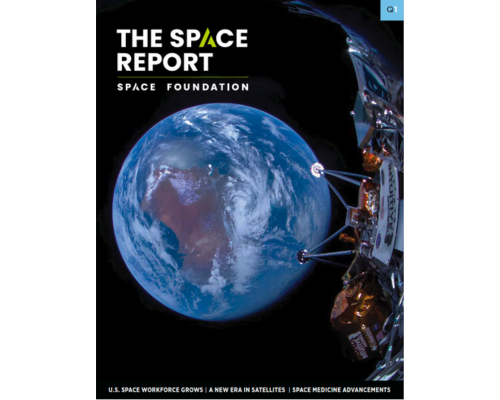Space Foundation Press Releases
The Space Report 2024 Q1 Finds Growth in U.S. Space Workforce, Record 2024 Launch Pace, Leaps in Commercial and Civil Spacecraft Technology
Written by: Space Foundation Editorial Team

- U.S. private space workforce grew 4.8% in 2023, with strong launch-related hiring
- 2024 is off to the fastest start of the Space Age, with 41 launches before March
- Moon landings are reaching their highest frequency since the early 1970s
- Lost payloads climb to an eight-year high, but overall loss percentage remains stable
COLORADO SPRINGS, Colo. — April 9, 2024 — Space Foundation, a nonprofit organization founded in 1983, offering education, collaboration and information for the global space ecosystem, today released The Space Report 2024 Q1, which shows steady job growth and better performance metrics in launch and payload activity amid growing U.S. budget threats and international tensions.
The number of private sector space workers in the United States jumped 4.8% in 2023, with a strong employment forecast for the sector promising more work ahead, especially in the growing commercial space market. Total employment in the U.S. space sector, including NASA employment and military roles, grew to 222,300 positions from 201,000 in 2022.
Globally, the space sector began 2024 with the fastest launch cadence of the Space Age, with 41 launches in January and February, including maiden flights for flagship launch vehicles from China, Japan and the United States.
In an analysis of the past 20 years of payload deployment, The Space Report found that lost payloads were at an eight-year high, and for the last four years, occurrences of multiple payloads lost in single launches also climbed. The article examines some of the factors involved in the losses and the mitigation efforts satellite operators are taking. Despite the increase in lost payloads, the rise in total deployments has kept the percentage lost stable with an average failure rate of 1.2%.
The United States government, the planet’s single largest space consumer, ended months of budget gridlock with a deal to keep civil and military space spending flat for 2024 and proposed flat spending again for 2025. The move ends several years of steady growth for NASA and Pentagon space budgets but also signals a strategic shift with federal agencies turning to commercial partners for lower-priced space services.
The threat of warfare reaching space came into stark focus in February, with the revelation of a Russian program that could use atomic weaponry to destroy satellites. The dangers of orbital warfare caused a stir in Congress and drove leaders in China, Russia and the United States to once again swear off nuclear weapons in space.
Threats on the horizon did not slow commercial space, as more entrants planned to grow constellations, especially in low Earth orbit, where smaller satellites and plummeting launch costs are driving a boom for businesses selling everything from communications architecture to Earth observation services that were once the sole domain of intelligence agencies.
Using tools and hardware from the swift commercial industry, the Pentagon’s Space Development Agency produced and launched 27 satellites to track missiles and improve communications in 30 months, setting speed records for government acquisition. The agency’s director, Derek Tournear, spoke exclusively to The Space Report about his vision for the future.
Space agencies such as NASA, JAXA and the European Space Agency are fueling advancements in the medical and pharmaceutical industries with medical breakthroughs developed in orbit improving the lives of millions of patients on Earth. The agency’s medical technology has resulted in as many as 100 NASA patents per year, with that technology licensed for commercial use.
About The Space Report
As an information leader, Space Foundation produces one of the most authoritative sources on the global space ecosystem — The Space Report — offering news-making information and insight on the global space economy and its activities. First published in 2006, The Space Report is an unparalleled resource for policy analysts, congressional staff, investors, researchers, and space industry professionals and newcomers.
With timely research, analysis, interactive data, and white papers, The Space Report provides greater understanding and insight on space exploration, global space spending, defense programs, commercial space trends, workforce development, launch and payload deployment, space innovation, and other key industry indicators.
The Space Report is available as an online subscription for regularly updated and expanded resources and datasets and also as a quarterly digital publication. To learn more about The Space Report, visit www.thespacereport.org.
About Symposium 365
Symposium 365 is the premier source for information and events in the global space ecosystem, offering authoritative news and insight as well as opportunities for networking and conducting business via Space Symposium and The Space Report. Serving commercial, government and education sectors, programs and resources are delivered in-person and online around the globe. To learn more about Symposium 365, visit www.spacesymposium 365.org.
About Space Foundation
Space Foundation is a nonprofit organization founded in 1983, offering education, collaboration and information for the global space ecosystem. Driven by partnerships, Space Foundation unites the entire spectrum of stakeholders — business, government, education and local communities — through support from corporate members, sponsors, fundraising and grants. Visit Space Foundation at www.SpaceFoundation.org, and follow us on Facebook, Twitter, Instagram, LinkedIn and YouTube.
###
All brand names and product names are trademarks or registered trademarks of their respective companies.
Tags: Space Foundation, The Space Report, Symposium 365, space launch, space technology, space innovation, space ecosystem, space advocate, space commerce, space exploration, satellites, space spending, commercial space, space defense, space workforce, Space Development Agency
Media Contacts:
Rich Cooper
Vice President, Strategic Communications & Outreach
Space Foundation
(202) 596-0714
[email protected]
Dottie O’Rourke
TECHMarket Communications
(650) 344-1260
[email protected]


